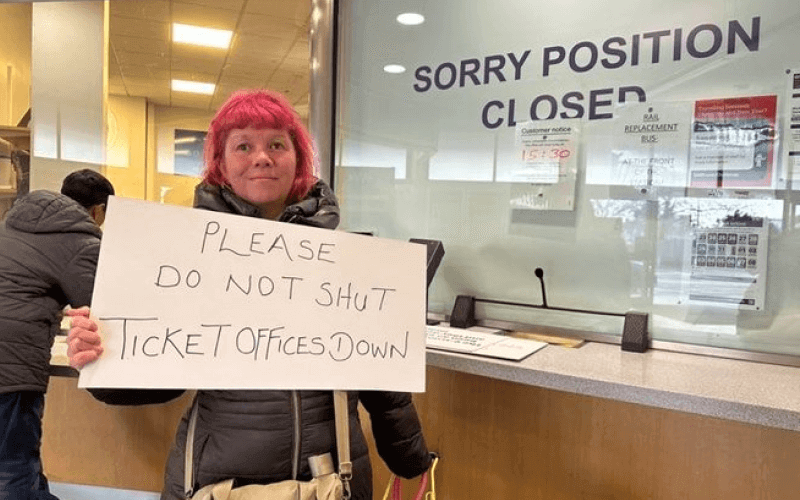Disabled activists have launched a legal action against four train companies and a government minister over a series of “woefully inadequate” public consultations that will lead to the closure of nearly 1,000 rail ticket offices.
Doug Paulley and Sarah Leadbetter, both of whom are leading disabled campaigners on accessible transport and regular rail travellers, say they believe the consultations are “a smokescreen” and the government has already decided to close the ticket offices.
They have called for a new consultation process, and a halt to any decisions on closures until their legal action is resolved.
Through their solicitors, Leigh Day, they have sent urgent legal letters to four publicly-owned train companies – LNER, Southeastern, Northern and TransPennine – and transport secretary Mark Harper.
In their pre-action protocol letter, they say the rights of disabled rail passengers are already being “widely undermined” by policies that will cut the number of staff available to assist them at stations.
The letter highlights how campaigners including the Association of British Commuters have been raising concerns for months about government plans to cut staff on the railways and the impact that would have on disabled passengers.
Paulley and Leadbetter (pictured) say the new proposals will see the closure of 974 ticket offices, and that it is clear the decision to close them “has been made and advanced by government”.
They also say that the 21-day consultation process will exclude many disabled people, because of its “extraordinarily short timescale” and its inaccessibility, and that the process has “multiple, serious flaws”.
And they say that information about the consultations is only available online or via standard print notices in stations, while parts of many of the online documents are inaccessible to screen-reading software, among other access concerns.
The four train operating companies have made no attempts to engage face-to-face with disabled people, while people with learning difficulties “are very unlikely to be able to understand the consultation documents available online”, the letter says.
And it says there is no clear information in the consultation documents on how the proposals will affect disabled people.
The letter also says that the statement of rail minister Huw Merriman that no currently staffed station would become unstaffed as a result of the closures was “simply not true”, as reported by Disability News Service last week.
The letter argues that the train companies, and the government, are breaching their duty to consult fairly, and breaching their duties under the Equality Act.
They say campaigners are “under the clear impression” that the ticket office closures are “a foregone conclusion” and that the train companies are “simply going through the motions of consulting”, with the government “steaming ahead with the proposals in the face of significant opposition”.
Paulley, a wheelchair-user, said: “The cuts are a fait accompli being pushed through the motions of this sham consultation, with its disingenuous claims and failure to give disabled people the information we need to respond properly.
“It is appalling that such an important topic is being handled in this manner and the process must be stopped.”
Leadbetter said: “People like me, with visual impairments, rely on ticket offices and their staff to help us when we’re travelling and their closure will be a huge blow.
“To hold a consultation that fails to properly hear the views of those who need assistance the most is woefully inadequate.”
Kate Egerton, senior associate at Leigh Day, said the consultations were “clearly unlawful and not fit for purpose”.
She said: “Not only does it fail to provide adequate time for people to respond to one of the biggest changes to our railway network in a generation, it denies a voice to disabled people who rely on ticket office staff for assistance when they travel.”
Meanwhile, Greater Manchester mayor Andy Burnham, and four other Labour mayors, are preparing their own legal action against seven train companies over the planned ticket office closures.
A note from the editor:
Please consider making a voluntary financial contribution to support the work of DNS and allow it to continue producing independent, carefully-researched news stories that focus on the lives and rights of disabled people and their user-led organisations.
Please do not contribute if you cannot afford to do so, and please note that DNS is not a charity. It is run and owned by disabled journalist John Pring and has been from its launch in April 2009.
Thank you for anything you can do to support the work of DNS…

 Making all self-driving pilot schemes accessible would be ‘counter-productive’ and slow us down, says minister
Making all self-driving pilot schemes accessible would be ‘counter-productive’ and slow us down, says minister Government’s ‘weak’ response to damning transport access report puts right to travel in ‘grave danger’
Government’s ‘weak’ response to damning transport access report puts right to travel in ‘grave danger’ Self-driving taxis that are not accessible will be allowed pilot scheme licenses, government suggests
Self-driving taxis that are not accessible will be allowed pilot scheme licenses, government suggests